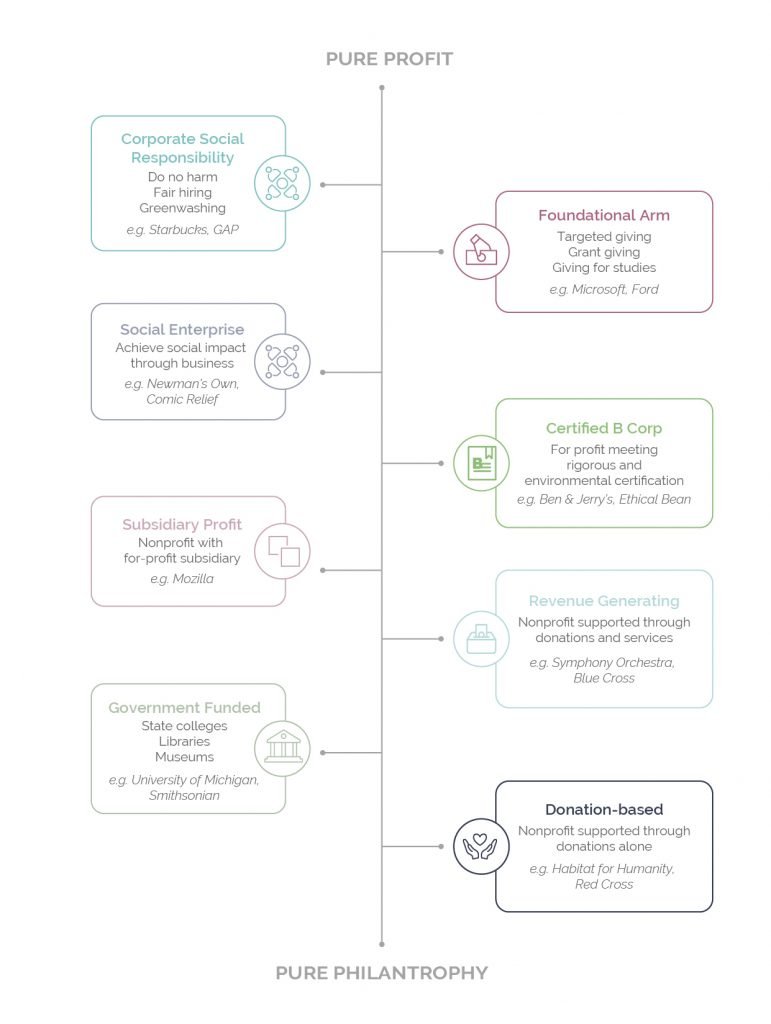6 minute read
Social impact
The Ross School of Business at Michigan University (Michigan Ross) defines Social Impact as: “a significant, positive change that addresses a pressing social challenge.”
Creating social impact is the result of a deliberate set of activities with a goal matching this definition. Social impact is grounded in the effect it has on a pressing social challenge.1
As with responsible investment strategies, businesses can be mapped for their social strategies on a scale from pure profit driven, to pure philanthropic.
The diagram below includes some examples of well-known consumer brands and where they fall on the scale from pure profit to philanthropy.2

Purpose driven business
 Watch: Business is about purpose: R. Edward Freeman at TEDxCharlottesville 2013
Watch: Business is about purpose: R. Edward Freeman at TEDxCharlottesville 2013
Key points:
- Business is about more than just profit.
- There are three flaws in the story that business is just about profit:
- Money in the purpose – profit is a necessity, but it is not the primary objective. Entrepreneurs do not start businesses just to make money – they start businesses because they are on fire about an idea or an issue.
- Business and Ethics contradiction – there is a mismatch between the story that is told about the purpose of business being to make profit and what we know it takes to run a successful business, and how we understand ethic – ethics is about how we interact with each other and is therefore at the center of business.
- People are not simple beings of pure economic self-interest – human beings have more complicated motivations than just ‘carrot and stick’ – we don’t leave our values at the door when we arrive at work.
- Business is about working together to create value together – for stakeholders, not just shareholders.
- Business is about purpose – get the purpose right and the profits follow
- Creativity is the only infinite resource we have – when the tradeoffs we are presented with are unacceptable – it sparks creativity and previously inconceivable solutions are often achieved.
- What we need to do …
- Put ethics and values at the same level on the agenda as making profit
- See conflict, challenge and critique as important and constructive – push back is key to reinforcing and living values
- Raise the bar and expect more from our companies and co-workers.
B Corp
The growing shift towards businesses thinking more deeply about their purpose for operation is exemplified by the growing B Corp movement. B Corp certifies businesses that ‘meet the highest standards of verified social and environmental performance, public transparency, and legal accountability to balance profit and purpose’.3
The B Corp community aim to leverage the profit and growth of private companies to combat societies most challenging problems that cannot be solved by governments and non-profits alone.
A survey by B Lab UK, the non-profit behind the B Corporation movement in the UK, and ReGenerate, an organisation promoting purpose-driven business found that seventy-two percent of the UK population believe that businesses should have a legal responsibility to the planet and people alongside maximising profits. Of those polled, 76% believe businesses have a responsibility to protect the natural environment and 47% believe businesses should have responsibility to solve social issues.
Definitions
What’s the difference between a Certified B Corp and a benefit corporation?
Benefit corporations and Certified B Corporations are often confused. The B Corp Certification is a third-party certification administered by the non-profit B Lab, based in part on a company’s verified performance on the B Impact Assessment. The benefit corporation is a legal structure for a business, like an LLC or a corporation. Benefit corporations are legally empowered to pursue positive stakeholder impact alongside profit. Some companies are both Certified B Corporations and benefit corporations, and the benefit corporation structure fulfills the legal accountability requirement of B Corp Certification.4
 Listen: Reasons to be Cheerful podcast Episode 166. TO B(CORP) OR NOT TO B: a different way of doing business
Listen: Reasons to be Cheerful podcast Episode 166. TO B(CORP) OR NOT TO B: a different way of doing business
Key Points:
20:08 – 34:11. UK perspective:
- The B Corp movement is trying to change the economic system from within to empower people to use business as a force for good.
- B Corp certified businesses meet the highest standard of verified social and environment performance with public transparency and legal accountability to be able to deliver profit, and a higher purpose.
- B Corps are based on the principle that companies have a duty not only to their shareholder but to employees, communities and the environment – they hold themselves accountable to the triple bottom line model.
- A perceived lack of humanity, ethics and accountability in how big businesses are run has led to a lack of trust and growing inequality – B Corps aim to restore that trust by reintroducing the ‘people’ element and carrying the ethics and values that people live in their daily lives through into the businesses they run.
- It can take companies 12-18 months to achieve B Corp certification – working with B Lab to refine their policies, commitments and actions, and update their articles of association to state that their aim is to optimise stakeholder returns – as against purely shareholder returns – making them accountable for and responsible to the wider stakeholder communities within which they exist – campaigners are advocating that this responsibility should be written into law rather than being voluntary as it currently is.
- The B Corp declaration of interdependence recognises that healthy economies require healthy people and healthy environments, all of which are interdependent.
34:11 – 43:58. US perspective:
- Shareholder primacy is the idea that the sole purpose of companies is to raise share prices – to make as much money for shareholders as possible.
- There are a number or perceived issues with this approach:
- In the US, share ownership is concentrated in a small group of already privileged people, thus contributing to widening the socio-economic gap.
- Concentrating on giving back to shareholders means there are less resources to be dedicated to the workforce in the form of benefits etc.
- Contributions to climate change can potentially be seen as justified if the end result is financially beneficial to the shareholder .
- Delaware corporate law, which is dominant in the US, states that in certain situations shareholder value must be the primary responsibility of the Board of Directors – this can lead to problematic behaviour from companies that is currently allowable in law and directing capital away from R&D and employee benefits.
- A stakeholder approach seeks to rebalance power within corporations, and between corporations and broader society.
- This approach calls for a re-assessment of what it means for a company to be publicly chartered – in return for public permission to operate, corporations should serve the public interest.
 Recommended Read: more information about B Corporation movement can be found on their website.
Recommended Read: more information about B Corporation movement can be found on their website.
1Business+Impact at Ross. 2021. What is Social Impact?. [online] Available at: <https://businessimpact.umich.edu/about/what-is-social-impact/>.
2https://businessimpact.umich.edu/wp-content/uploads/2018/06/socialimpact-continuum-light.pdf
3Bcorporation.uk. 2021. About B Corps | Certified B Corporation. [online] Available at: <https://bcorporation.uk/about-b-corps>.
4https://bcorporation.uk/faq-item/what-difference-between-b-corporation-and-benefit-corporation

